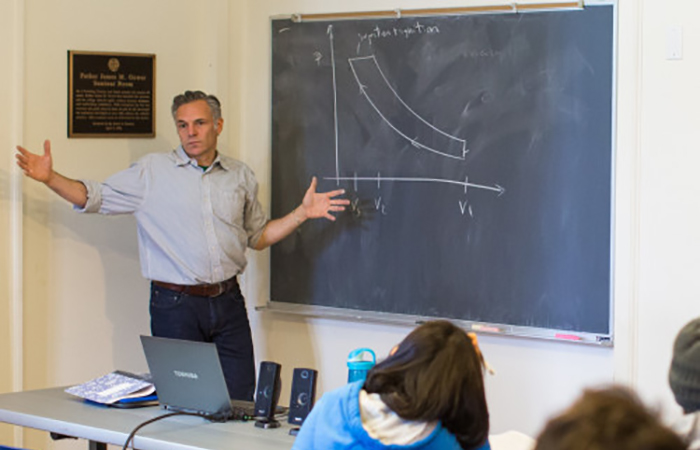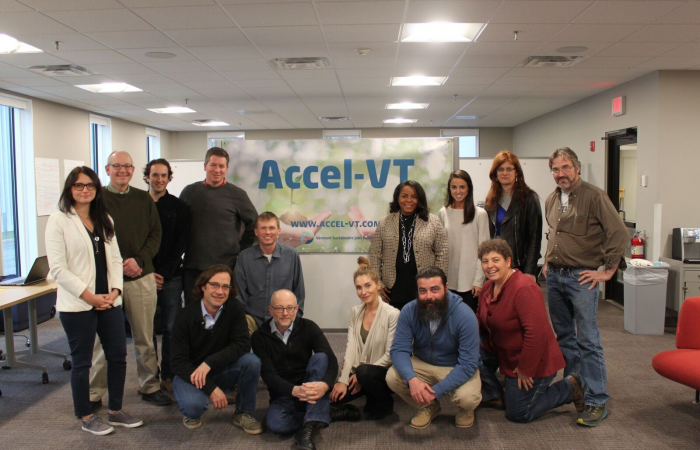It turns out there’s an expert in Complexity Theory at one of Maine’s educational gems, the College of the Atlantic. Professor Dave Feldman was kind enough to spend some time with us and we think you’ll agree that he’s a fascinating person!
Professor Feldman joined the faculty of CoA in 1998 and has taught over 20 different courses since then. From 2003 to 2006 he served as the Dean of Academic Affairs and later, in 2006, was the Co-director of the Santa Fe Institute’s Complex Systems Summer School in Beijing, China. For the 2011-12 academic year, he was a Fulbright Lecturer in Rwanda at the Kigali Institute of Science and Technology.
Dave received a B.A. in Physics from Carleton College in 1991 and a Ph.D. in Physics from the University of California at Davis in 1998. He is the author of the textbook Chaos and Fractals: An Elementary Introduction (Oxford University Press, 2012). He has developed two MOOCs on the Santa Fe Institute’s Complexity Explorer platform, one on chaos and dynamical systems and one on fractals and scaling. Dave has also written a short overview of the field of chaos that will be published in 2019 as part of the Santa Fe Institute and Princeton University Press’s series, Primers in Complex Systems. He is working on an interdisciplinary textbook on sustainable energy. He currently serves as the director of the Santa Fe Institue’s Complex Systems Summer School.
If you were drinking a beer at the Atlantic Brewing Company, how would you describe complexity theory to a couple of tourists?
I’d begin by noting that there isn’t really such a thing as complexity theory, at least as the term “theory” is usually used to indicate a broad explanatory framework. I think of complex systems as an interdisciplinary area of study that looks at organization or complexity in diverse systems. There is a still-emerging set of mathematical tools and concepts used to analyze complex systems. An open question is to what extent different complex systems share general features.
For people who haven’t studied Complexity, why is it important?
The field of Complex Systems looks at how order or complexity emerges and is maintained in a wide array of physical, biological, social, and cultural systems. So it touches upon some of the central questions of our age: inequality, hierarchy, and the wealth gap; how norms and institutions change and evolve; how ecosystems and economies will change with a changing climate. Additionally, I think the study of complex systems is a lot of fun. It’s a mix of topics and techniques from across the sciences, especially computer science, and it attracts creative, out-of-the-box thinkers.
The study of complex systems is quite vast, what areas of research do you think show the most promise?
I’m particularly intrigued by recent lines of work that combine mathematical models and analysis with large bodies of data and/or behavioral experiments to address questions of how norms and practices are formed and maintained in socio-cultural systems. This work draws upon some of the clarity and simple models found in economics and mathematics but seeks to ground them empirically.
Can you share a bit about the work you did with the Santa Fe Institute both with their Complexity Explorer Project and the Complex Systems Summer School?
In Beijing and Santa Fe, I’ve served as the director of SFI’s Complex Systems Summer School. The CSSS is a month-long program that brings together 70-80 grad students, postdocs, and people working on complex systems in the industry. The program consists of pedagogical lectures from a range of perspectives and disciplines within complex systems. Each student also takes part in one or two interdisciplinary, collaborative research projects and presents their results at the end of the CSSS. I help select the lecturers and make sure the program runs smoothly. I’m helped by a fantastic team at SFI.
I’ve developed two MOOCs (Massive, Open, Online Courses) for the Complexity Explorer site, http://www.complexityexplorer.org. Putting these courses together took a lot of time, and working in video was challenging and a bit intimidating at first. But I soon got more comfortable working in this medium and I was very happy with how the two courses went. It’s been very gratifying to teach about topics that I love to such a large and diverse audience. Students from over 90 countries have taken my courses; over half of them are not native English speakers. In these political times, being able to connect in this way to people from all over the world feels especially important.
How did the experience of being an educator in other parts of the world shape your thoughts about complexity?
In addition to working with the CSSS in China from 2004-09, I was also a US Fulbright Lecturer in Rwanda in 2011-12. Living and teaching in another country made me appreciate how there are different ways of organizing a society. As one spends more time in a culture different from one’s own, practices that at first seem illegible or illogical gradually come into focus and cohere. One sees a hidden logic or order. This has reminded me that complexity and structure takes many forms, and so I’m wary of a simple, universal theory of complex systems.



